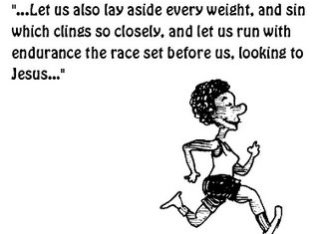
Hebrews 12:1-17 speaks of the Christian life as a race. Here are some thoughts concerning that race which were helpful in my Christian walk/race!
I. Pattern for our race.
A. OT Saints (chapter 11)
- Ran it by faith
- Endured hardship (self-chosen risk and external persecution)
- Had a definite goal in view (Abraham = heavenly city; Moses = wealth/reward of Christ)
B. Christ (vs. 1-4)
- Trusted the Father [had faith, in a sense] (“for the joy”; learned obedience)
- Endured hardship (cross, shame, sinners, hostility, death)
- Had a definite goal in view (joy; redeem a people for God)
II. Problem for our race.
A. We need faith
- To see the witnesses
- To see Jesus
- To see the reward
B. We have obstacles
- Weights (entanglements, see 2 Tim. 2:4)
- Sins (besetting sins)
C. We have hardships
- Requires endurance (v. 1)
- Potential weariness (v. 3)
- It is painful (v. 11)
- Wears us out (v. 12)
- Requires striving (v. 14)
III. Purpose of our race
A. Ultimate purpose
- To win the prize (1 Cor. 9:24-27)
- To gain Christ (Phil. 3)
- To see the Lord (Heb. 12:14)
B. Progressive purposes
- Our good (v. 10)
- Share in his holiness (v. 10)
- Fruit of righteousness (v. 11; Phil. 1:10-11)
IV. Perspective for our race
A. Our intensity/difficulty is really minor
- Consider Christ (v. 3-4)
B. Our difficulty is to be welcomed not begrudged (v. 5-6)
C. No difficulty = no sonship (vs. 7-8]
D. God is working in this for our good (v. 9-10)
E. Our hardship is unpleasant but effective (v. 11)
F. Keep the pitfalls in view.
V. Pitfalls of our race
A. Potential to not see the Lord (v. 14)
B. Potential to fail to obtain grace (v. 15)
C. Potential to become or be poisoned by a “root of bitterness” (v. 15–also cf. Dt. 29:18ff. for the OT context of the phrase “root of bitterness”)
D. Potential to cross the line and be rejected finally (v. 16-17)
VI. Partners for our race
A. Brothers (and sisters) in Christ
- Strive together (v. 14)
- Help all (v. 15)
- Prevent any (v. 16)
- Also see Heb. 3:12-14 and 10:24-25
B. Christ (vs. 2)
The outline above should be sufficient for you to catch the gist of my thoughts on this passage. But let me expound on a few points so you better understand the outline. First, I take the “chastening” or “discipline” of verses 5 through 11 to be not so much God’s punishing us when we do evil as it is the whole difficulty involved in the sanctification process. What makes me conclude in this way? Well, verse 3-5 uses the concept of chastening to remind us to not view the race with a bad attitude. Verse 7 continues, “It is for discipline that you have to endure”. I see that as connected with the endurance mentioned in verse 2 and 3. In other words the whole Christian life–the race–requires endurance because it is God’s disciplining work. Verses 11-13 go back to the race metaphor again, showing that chastening should be viewed within that motif. Further, if chastening is done only to believers, and yet all the lost equally reap the bad results of their bad deeds, something different must be understood in the idea of chastening. I do not discount that an inward grief and struggle concerning sin is in view with this chastening, but it is only part of it and not the sum total of chastening.
Second, some of you may wonder what I am getting at under point number 5–the pitfalls. Feel free to consult a post dedicated strictly to this concept–the perseverance of the saints–entitled “Once Saved, Always Saved?!?!”. There I maintain that the warnings against apostasy are real and are used to help us become sanctified. In our race, we better remember that if at any time we give up, we may very well prove to have been a fake all along (1 Jn. 2:19). Only those who endure to the end will be saved, remember.